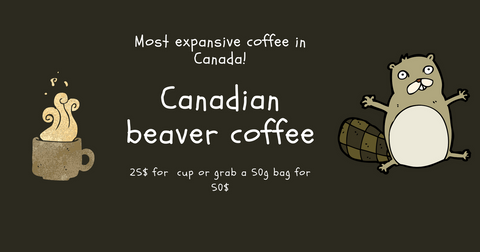What determines the price of a coffee? What is the difference between a coffee at $30/kg and a coffee at $200/kg?
This is a subject that I want to address, because I believe that there is a danger here because certain companies are putting coffees on the market at exorbitant prices without having any reference on the evaluation of these coffees apart from the fact that it is an internal evaluation. But the coffees sold by a roaster are like our mother-in-law's apple pie, it's always the best in the world...
First, the 3rd wave coffee movement, driven by baristas and roasters around the world, helped take coffee outside of convenience products. I participate in my own way by offering coffees of different quality levels, being transparent about their origin, the price paid, and the roasting levels. I also try to share my knowledge as much as possible by sharing it with baristas, but also several roasters who are active in Quebec today. I maintain a very open approach towards my fellow roasters, and I favor collaboration instead of competition. But I believe that we must be careful in the way we present our coffees to our customers so as not to introduce into the market coffees labeled as grands crus when they may be very good coffees, but by inflating their price, we are breaking the value and the possibility for producers to put real batches of exceptional coffee on the market.
The marketing of high-end coffees is relatively new in Quebec and we were among the pioneers in this field in Quebec with the purchase of coffee from independent evaluations sold at auction.
We must understand that the evaluation of coffees is done using a protocol known and followed by professionals in the field. This protocol was established by the SCAA (Specialty Coffee Association of America). And the result of this evaluation, called the 'cupping score', is reliable enough to determine the price and tasting potential.
In the field, all scores evaluated internally must be supported by an independent process to be credible. Because there's a lot of money on the table when it comes to assessing the value of a coffee. Each player has an interest in giving the best possible score to increase prices.
It's like if you went to a used car seller, and the seller gave you a price for a car. And you take the car and have it evaluated by 10 expert mechanics who have no connection with each other. Admit that the price set subsequently would then be much more solid and credible.
This is why we reserve the status of grand cru coffee, truly high-end, for coffees which have undergone evaluations by several independent people, who are not connected to the company and which have obtained a sufficient tasting note. We do it for us, but we also do it for our customers.
There are several such platforms in the world, but the main one is that of the Cup of excellence.
https://allianceforcoffeeexcellence.org/
This platform is independent and allows a rigorous and unbiased evaluation of coffee shops. Each coffee is evaluated numerous times to obtain a fair ranking for the auction. The difference between batch #1 and #2 can have a big difference in the money received by the producer.
And if I salute the work of certain roasting colleagues to promote the notion of quality in coffee, I believe that offering coffee at more than $400/kg for a coffee that has not undergone any external evaluation risks harming the coffee market. this type of coffee. Because, if I come back to apple pie, my mother-in-law really makes the best apple pie in the world.
The risk of consumer disappointment is great.
In the case of the value of a coffee, it should not be completely subjective and based on the opinion of the seller. Especially when offered at prices over 100 times the price of regular coffee.
At more than $400/kg, we must place coffee among the most expensive in the world, at the same level as those having obtained 1st place in the Cup of excellence. And let me omit the aberrations of kopi luwak and elephant dung which are more of a folkloric level than a tasting experience.
For example, we have just purchased a coffee which has passed through the CoE platform, with a rigorous independent assessment. It is the 3rd best coffee in Brazil, Pulped natural category, with a score of 90.83 points. Only a small percentage of coffees in the world exceed the score of 90 points.
The price paid for coffee is publicly displayed here:
https://allianceforcoffeeexcellence.org/brazil-pulped-naturals-2017/#1513038059038-106d1cd7-3c49
See lot #3A - buyer Brulerie du quai = 18.40$USD / lbs which gives us, including the exchange rate and transport, a cost of around 80$/kg for green coffee. The rest of the price corresponds to the weight loss of approximately 15% during roasting, roasting at 20% of the maximum capacity of the roaster for more control over cooking, thus reducing the efficiency of the machine on the cost price per kg. We then add our operating costs and the usual margins for the sale. Which brings us to the price mentioned above.
For the price of a regular coffee, with a cupping of 84, as you can find in our classic range, it can be bought for around $8/kg and sold for $30-32/kg.
We have been importing coffees like the lot purchased from Brazil since 2011, and our network has been slowly built like a buying club. This requires fairly tight inventory management, because the value of our grain inventories can reach several hundred thousand dollars.
I believe that both in our vocabulary and in establishing sales prices, we must ensure that we have a scale to truly identify the level of a coffee. This is also what I criticize the most about the coffee industry, which constantly displays an increase in the level of the real quality of coffees. Not all coffee is equal. Far from there. Hence our desire to express these differences by offering our coffees in three distinctive ranges. And no, our classic range coffees are not the best in the world. But for those in the Réserve Selecte range, I can confidently say that we are among the best coffees available on the planet.
I would hate to see a bubble in the coffee industry, with astronomical prices based on the seller's judgment alone. I think there is a danger of undermining the notion of quality and people will end up saying: I tasted it and it tasted the same as a $50/kg coffee. Thus creating distrust towards the industry as a whole.
In the context of preparation by the cup in a coffeeshop at $10 per cup, the same risk, with the added possibility that the employee will miss his preparation. ''I tasted it and it tasted like a $2 coffee''...
The only thing missing is that Pierre-Yves McSween talks about it in one of his columns.
In short, I very much hope that we will protect our industry by introducing consumers to the notion of a quality scale in coffee by providing measurable and concrete differentiating elements. Otherwise, we remain in the caricatured positioning of the product and will remain at the same level, despite a great story, as coffees digested by Indonesian civet cats.



Comments (0)
There are no comments for this article. Be the first one to leave a message!